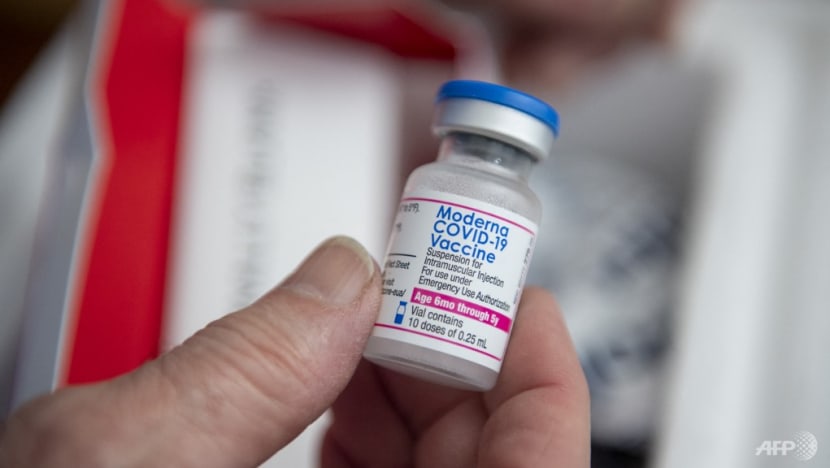One in three parents in Singapore hesitant to get children vaccinated against COVID-19: Study
Those with reservations about getting their children vaccinated had a lower level of trust in their children’s doctors, the study found.

A medical worker holds a vial of the Moderna COVID-19 vaccine for children at Temple Beth Shalom in Needham, Massachusetts, on Jun 21, 2022. (File photo: AFP/Joseph Prezioso)
SINGAPORE: A third of parents in Singapore are hesitant to vaccinate their children against COVID-19, a new study has found.
The study was conducted between November last year and March this year by a group of paediatricians from the Khoo Teck Puat – National University Children’s Medical Institute at the National University Hospital (NUH).
It surveyed 628 parents aged between 32 and 45, two-thirds of whom were Singaporeans, on the impact of social media and other factors on vaccine hesitancy towards their children.
Singapore started offering COVID-19 vaccinations for children between the ages of six months and four years from Tuesday (Oct 25). Children between the ages of five and 11 were also able to get their booster doses from this date.
STRENGTHEN RAPPORT WITH CHILDREN’S DOCTORS
Those with reservations about getting their children vaccinated also had a lower level of trust in their children’s doctors. Just 41.8 per cent of vaccine-hesitant parents said they fully trust their child’s doctor.
The same sentiment was shared with 68.3 per cent of parents who would allow their children to be vaccinated.
The recent study found that parents with higher income and education levels had fewer reservations about getting their child vaccinated.
The vaccination status of parents played a part in their decisions too, with those unvaccinated against the coronavirus being more apprehensive about having their child vaccinated.
Another finding from the study was that fathers were slightly more vaccine-hesitant than mothers. Among fathers, 39.1 per cent were vaccine hesitant, compared to 30.4 per cent of mothers.
While there was no difference between vaccine-hesitant and non-hesitant parents in their use of social media to obtain information about COVID-19, parents who were vaccine-hesitant were less likely to use other sources such as newspapers to obtain relevant information.
To reduce vaccine hesitancy, doctors have to strengthen their rapport with parents of young children, researchers recommended.
Dr Low Jia Ming, associate consultant at the NUH’s Khoo Teck Puat – National University Children’s Medical Institute, said: “This requires us to work with each and every parent during opportune moments, during the consultations, to address any of their concerns that they have … and to work together to ensure that they receive the vaccinations in a reassured fashion.”
You may also be interested in:
BOOKMARK THIS: Our comprehensive coverage of the COVID-19 pandemic and its developments
Download our app or subscribe to our Telegram channel for the latest updates on the coronavirus pandemic: https://cna.asia/telegram
















